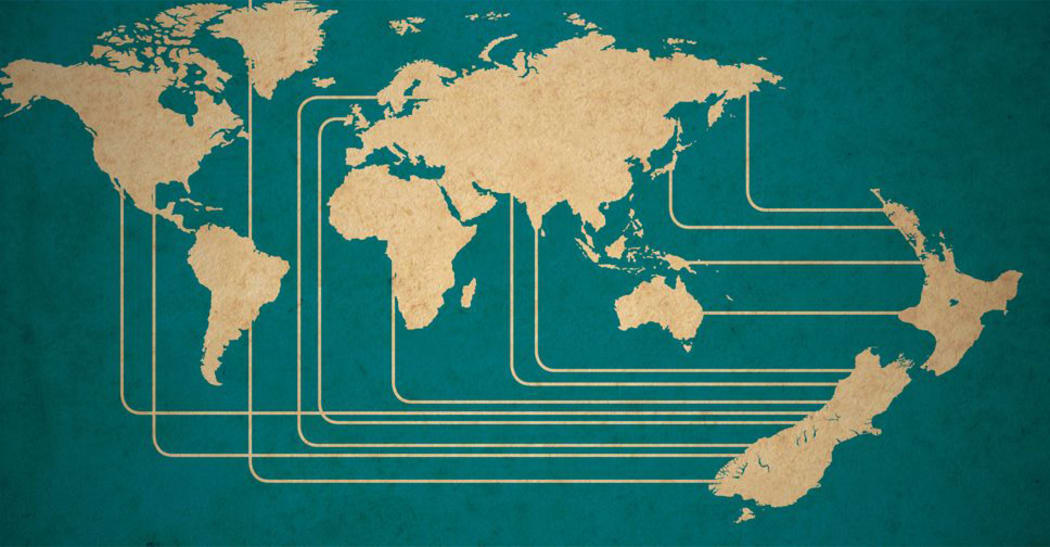New Zealand’s made a name for itself by having a lot of sheep, a decent rugby team, and a claim on pavlova. But four Silicon Valley investors see more to Aotearoa than sugary whipped eggs and are touring the country to meet Kiwi entrepreneurs.

Photo: Illustration: Doug Gaylard
In 2006, Brian Monahan had an idea. Because of that idea, he swapped a Harvard education for four years on his brother Matthew’s pull-out couch as they turned his idea into a company.
His idea led to Inflection, a company that has developed multiple data services that collate and shape people’s digital identities. Six years on, the brothers sold one of their products, Archives.com, for $US100 million.
The two brothers have a fondness for New Zealand which has resulted in about 25 visits and a couple of property purchases over the past five years. Visit number 26 included a panel discussion in Wellington’s central city where Brian kicked off the discussion with a rap.
“When you come from overseas, the first thing you see, is just trees and honey bees ... got world champion rugby and Lord of the Rings. Awesome manuka honey and earth’s happiest sheep.”
Like global tech hub Silicon Valley, Brian says New Zealand has an innovative culture and really clever problem solvers who make use of what’s at hand to get the job done.
But one point of difference is Kiwi values, which he also rapped about:
“With a culture not based on commerce but on kindness, one that values the importance of wisdom, balance and silence. Kiwi’s value fairness, compassion, and honesty, witty and reflective with self-effacing modesty.”
Brian reckons New Zealand is building on its sheep farmer reputation by leading the way in agricultural technology (which he didn’t rap about).
“There’s a start-up based down in Nelson which uses embedded sensors in the soil to track where irrigation needs to happen and where it doesn’t need to happen. It seems very simple, like of course we would track where there’s already water and not irrigate there, but the vast majority of farms don’t do that simple practice.”
Fellow panel speaker and start-up legend, Sam Altman, agrees New Zealand has the edge on “ag-tech” but also thinks the distance from other countries helps entrepreneurs concentrate on the task at hand.
“New Zealand is a little bit insulated but not too insulated and so people can really focus and build up their expertise. There’s not the distraction of being in the middle of the Bay Area with people switching jobs all the time and a super high cost of living so that works really well.”
Sam is the president of the start-up accelerator Y Combinator which has given over 800 start-ups a little bit of money and a lot of advice, including Reddit, Codecademy and Dropbox.
He says something like the lamb boning X-ray machine from Otago is uniquely New Zealand but the country is more than just sheep and hobbits.
“A big part of my job is to find people around the world to start companies and over the last few years we have funded more and more people from New Zealand,” he says. “One of them is Science Exchange, which helps people who want to run an experiment find a lab around the world. Another company is called Teespring” (Teespring allows anyone to design and sell custom apparel with zero upfront costs).
Another Kiwi advantage for entrepreneurs is New Zealand’s can-do attitude towards changing legislation, particularly compared to the United States.
Foundersfund, partner Scott Nolan says New Zealand could take advantage of this.
“For something like drones, in the US it’s really ambiguous what the regulation is going to be and people have been waiting for the Federal Aviation Administration to make a decision on this for a while and they haven’t, not yet at least. A lot of these drone companies in the US have been asking, where can we go commercialise?”
But having the best idea ever won’t be enough to get the dollars flowing from investors. All the panel speakers agreed the success of a start-up depends on the passion of the founders and the team behind them.
“Only start a company if you feel like it’s the only thing you can do,” Scott says. “If you don’t feel that strongly about it then the hard times of starting a company are so hard that you’re probably better off joining another company.”
“No company that we’ve ever funded that has been founded by one person is in our top 30 most successful companies,” says Sam. “These things are so hard to do and the psychological ups and down are so intense that if you have a co-founder or two, hopefully you don’t all crash at the same time and you can support each other.”
But Kiwis have the right stuff to make it work, according to the final verse of Brian’s rap:
“You ain’t gotta live in New Zealand to live Kiwi.
It’s a state of mind shift that’s a different way of being,
it’s a different way of taking action and a different way of dreaming,
of an information economy based in a regenerative ecology,
spreading philosophy through technology,
about how it is that we’ve gotta be living on this planet,
fairness standard, none abandoned,
grounded skilfully into being, seeing this life that we’ve been handed.
Peace.”


